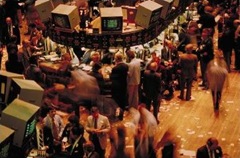A reader named Trent pointed me to a story that 60 Minutes did last week, Retirement Dreams Disappear With 401(k)s. It’s not their best work, and I’m not one who thinks much of their best work.
Helpfully, the CBS website gives a near transcript of it, so I can easily quote the way over-the-top copy read by the reporter, Steve Kroft.
the way over-the-top copy read by the reporter, Steve Kroft.
It was a gray, chilly morning in midtown Manhattan and a line of unemployed, mostly white-collar workers, stretched for blocks around the Radisson Hotel. More than 1,000 middle managers, stockbrokers, consultants, secretaries and receptionists had come hoping to find a job.
It was called a career fair, but there was no merriment – only a whiff of desperation.
Many of the people at the career fair have been out of work for months and burned through their liquid assets; their future, even bleaker than the present.
Read more »
Yesterday’s Wall Street Journal had a column by Brett Arends in which he wrote positively on a relatively esoteric strategy, namely investing in the S&P 500 index while writing (i.e. selling) call options on that index. It’s just the  sort of thing that, in a different time and place, big media journalists would condemn as the foolish scheme of too-clever-by-half financial engineers.
sort of thing that, in a different time and place, big media journalists would condemn as the foolish scheme of too-clever-by-half financial engineers.
I never know how much or how little to explain about the mechanics of financial instruments, but since I generally advise folks to steer clear of options, I will assume that a relatively long explanation of what Arends is talking about is in order. So excuse me if the next few paragraphs are painfully obvious for you.
A call option is an option to buy something at a specified price for a specified time in the future. So you might have an option to buy a share of GM stock at $5 on June 30. If on June 30 GM is trading above $5, then your option is “in the money” meaning that the ability to buy at that price is worth something. (It’s worth the difference between the current price and $5.) If it is trading for less than $5, then the option isn’t worth anything, since buying at $5 would be pointless.
Read more »
Just to recap, in this (more occasional than I intended) series I am discussing Dave Ramsey’s Seven Baby Steps. I’m skipping steps 1, 3, and 5 because there’s not much to say about them. (They are, in order, $1,000 to start an Emergency Fund, 3 to 6 months of expenses in savings, and College funding  for children.) I’m sure that if I looked carefully into these three I could find something to disagree with, but with so many other things to get myself upset about, I just don’t have the time.
for children.) I’m sure that if I looked carefully into these three I could find something to disagree with, but with so many other things to get myself upset about, I just don’t have the time.
I already did step 2. The official title of Step 4 is “Invest 15% of household income into Roth IRAs and pre-tax retirement.” Plenty there to get my dander up. Why 15%? Why Roth? And then there’s how Ramsey wants you to invest the money. Oh my. This may be a long post.
There’s nothing scientific about 15%. As far as I can tell, it’s just a number Ramsey thinks sounds about right. Ramsey does concede that a few percent higher or lower probably won’t kill you, but, at least in The Total Money Makeover, he doesn’t explain why 15% and not 10% or 20%. (Total Money Makeover has a chapter on each step and so is, along with his website, my primary source for his advice for this series.)
Read more »
As would be expected from any serious economic downturn, Americans’ emotional reaction to the Great Recession is mostly a predictable collection of negative feelings: sorrow, fear, despair, regret, and so on. But there is another emotion in the mix that took me a little while to understand. It is anger. To be more specific, it is anger about losses in stocks and other financial assets.
It took a while for me to pick up on this partially because it is so alien to the way I think about my investments. Not to go too far into unpleasant details, but I have lost a lot of money in the stock market in the past year. Really a lot. I am sad about this. I am regretful that I didn’t bail out when I could have. I even feel foolish about a few particular investments I chose. But I am not angry at anybody about it. Why would I be?
way I think about my investments. Not to go too far into unpleasant details, but I have lost a lot of money in the stock market in the past year. Really a lot. I am sad about this. I am regretful that I didn’t bail out when I could have. I even feel foolish about a few particular investments I chose. But I am not angry at anybody about it. Why would I be?
I knew what I was getting myself into. As readers of this blog know, my attitude to the stock market can be characterized as long term optimism tempered with a healthy dose of life-isn’t-always-fair. I knew that the market going down by half was not likely, but always a possibility. It had happened before. And I knew that although being a long-term investor increased my chances of a happy ending, nothing guaranteed one.
Read more »
Not long after you convince yourself that buy-and-hold is the best way to invest in the stock market, you start to get doubts. Sure, owning a well diversified portfolio of stocks through thick and thin is the best way to capture the high long-term average returns that you expect, but couldn’t you do a little better? Couldn’t you sell your stocks when the market is particularly high and maybe double down when it is particularly cheap? How hard could that be?
 Pretty darn hard, it turns out. Only in the clarity of hindsight are those market peaks and bottoms obvious. The towering heights that the market reached in the spring of 2000 and fall of 2007 now look like great places to exit only because we know what happened next. Yes, stocks in 2000 were by many measures more expensive than they had ever been in the past, but saying that everybody should have therefore known to sell is unfair, because stocks had been unprecedentedly expensive in each of the four or five years prior to 2000 as well.
Pretty darn hard, it turns out. Only in the clarity of hindsight are those market peaks and bottoms obvious. The towering heights that the market reached in the spring of 2000 and fall of 2007 now look like great places to exit only because we know what happened next. Yes, stocks in 2000 were by many measures more expensive than they had ever been in the past, but saying that everybody should have therefore known to sell is unfair, because stocks had been unprecedentedly expensive in each of the four or five years prior to 2000 as well.
Read more »
 the way over-the-top copy read by the reporter, Steve Kroft.
the way over-the-top copy read by the reporter, Steve Kroft.


